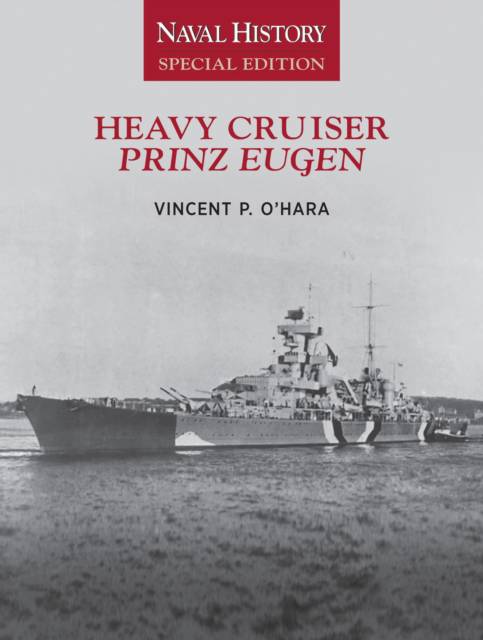
- Afhalen na 1 uur in een winkel met voorraad
- Gratis thuislevering in België vanaf € 30
- Ruim aanbod met 7 miljoen producten
- Afhalen na 1 uur in een winkel met voorraad
- Gratis thuislevering in België vanaf € 30
- Ruim aanbod met 7 miljoen producten
Zoeken
Omschrijving
Building upon the expertise of the authors and historians of the Naval Institute Press, the Naval History Special Editions are designed to offer studies of the key vessels, battles, and events of armed conflict. Using an image-heavy, magazine-style format, these Special Editions should appeal to scholars, enthusiasts, and general readers alike. The German heavy cruiser Prinz Eugen was a remarkable vessel by any standard. She was arguably one of the most handsome major warships ever constructed. The third ship of the Admiral Hipper-class and named for a French hero of the Austrian Empire, the ship represented the spirit and tradition of the old Austro-Hungarian Royal and Imperial navy. She participated in some of the most interesting naval actions of World War II in European waters including the Battle of the Denmark Strait where she helped the German battleship Bismarck sink the British battlecruiser Hood, and the Channel Dash ten months later when she sailed through the English Channel in broad daylight, successfully repelling British sea and air attacks along the way. She fought the Russians in the Baltic and was the largest German warship to survive the war. Handed over to the Americans as a war prize and given hull number IX-300, she was sunk in an atomic bomb test at Bikini Atoll in the Marshall Islands. Today, her wreck is a popular dive attraction in shallow water at Kwajalein Atoll. This book provides more than just a complete record of Prinz Eugen's career. The collection of maps and photographs reveals every aspect of her brief but intense time afloat and O'Hara reviews her design and equipment with meticulous detail. When launched, the German cruiser was one of the most technologically advanced warships afloat with the world's best electronics suite, and with sensors so advanced, the Americans had nothing similar (her hydrophones detected Hood at more than twenty miles). This is an in-depth look at the remarkable career of a remarkable ship.
Specificaties
Betrokkenen
- Auteur(s):
- Uitgeverij:
Inhoud
- Aantal bladzijden:
- 120
- Taal:
- Engels
- Reeks:
Eigenschappen
- Productcode (EAN):
- 9781591148722
- Verschijningsdatum:
- 15/10/2022
- Uitvoering:
- Paperback
- Formaat:
- Trade paperback (VS)
- Afmetingen:
- 206 mm x 272 mm
- Gewicht:
- 340 g

Alleen bij Standaard Boekhandel
+ 44 punten op je klantenkaart van Standaard Boekhandel
Beoordelingen
We publiceren alleen reviews die voldoen aan de voorwaarden voor reviews. Bekijk onze voorwaarden voor reviews.











